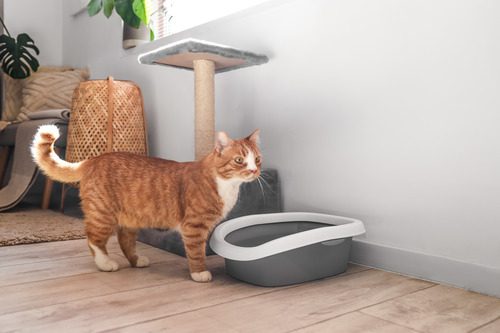Constipation in Cats: Signs to Look For
Caring for your cat means being aware of their health and comfort at all times. One common issue that might not always be at the forefront of pet owners’ minds is constipation in cats. It’s a condition that can cause your cat discomfort and, if not addressed, may lead to more serious health problems. At Festival Animal Clinic in Centennial, Colorado, we’re here to guide you through understanding this condition, recognizing the signs, and knowing when it’s time to seek professional help. If you’re worried about your cat’s bowel movements, or lack thereof, give us a call at (303) 850-9393 to schedule an appointment.

Understanding Cat Constipation
Constipation in cats occurs when stool moves through the colon too slowly, causing it to become dry and hard. This makes it difficult for your cat to pass it, leading to decreased frequency or absence of bowel movements. Several factors can contribute to this condition, including dehydration, diet, hairballs, and underlying health issues.
What Causes Constipation in Cats?
- Dehydration: A key factor that often leads to constipation is lack of adequate water intake. Cats are known for their low thirst drive, which makes them susceptible to dehydration and subsequently constipation.
- Diet: The type of food your cat eats plays a significant role in their digestive health. A diet lacking in fiber can lead to difficulties in bowel movements.
- Hairballs: Cats groom themselves regularly, which means they swallow hair that can form hairballs. Sometimes, these hairballs can obstruct the colon, leading to constipation.
- Underlying Health Issues: Certain medical conditions like kidney disease, obesity, or issues with the colon itself can cause constipation.
Signs of Constipation in Cats
Recognizing the signs of constipation in your cat is the first step towards helping them. Here are some symptoms to watch for:
- Infrequent Bowel Movements
- Straining or Discomfort
- Hard, Dry Stool
- Lack of Appetite
- Lethargy
- Vomiting
When to Seek Veterinary Help
It’s crucial to understand when constipation is a sign of a more serious condition that requires professional intervention. Here are some guidelines:
- If the signs of constipation persist for more than a couple of days, it’s time to seek veterinary care.
- Should your cat appear to be in pain or distress, don’t hesitate to call us.
- If constipation is accompanied by other symptoms like vomiting, lethargy, or a complete lack of bowel movements for more than 48 hours, it’s critical to get your cat examined by a professional.
At Festival Animal Clinic, we can provide a thorough examination and appropriate treatment to relieve your cat’s discomfort and address any underlying issues. If you’re concerned about your cat’s bowel movements, or if you’ve noticed any of the signs mentioned above, please call us at (303) 850-9393 to make an appointment.
Preventing Constipation in Cats
While not all cases of constipation can be prevented, there are steps you can take to minimize the risk:
- Ensure Adequate Hydration: Make fresh water available at all times and consider using a cat water fountain to encourage drinking.
- Dietary Management: Feeding your cat a balanced diet with the appropriate amount of fiber can help maintain healthy digestion.
- Regular Grooming: Especially for cats that shed a lot, regular grooming can help reduce the amount of hair ingested during self-cleaning.
- Exercise: Regular physical activity helps keep the digestive system moving and can reduce the risk of constipation.
Contact Festival Animal Clinic Today
Constipation in cats is a common issue that, while often mild, can sometimes signal more serious health problems. Being vigilant about your cat’s bathroom habits and overall health can help catch issues like constipation early. At Festival Animal Clinic in Centennial, Colorado, we’re committed to providing the care your cat needs to live a comfortable and healthy life. If you’re concerned about constipation or any other health issues in your cat, don’t hesitate to reach out. Give us a call at (303) 850-9393 to schedule an appointment.
